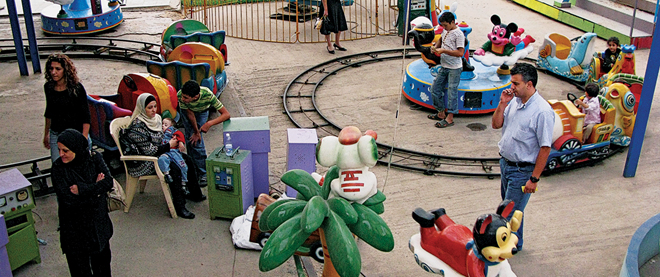Panic on the playground
New anti-pedophile measures bar adults without kids from visiting parks and museums
Photo by Kaveh Kazemi/Getty Images
Share

When it comes to playground safety, New York isn’t taking any chances. In June, police ticketed two women eating doughnuts on a bench inside one of the city’s public playgrounds; another doughnut-eating pair on a nearby bench also received tickets. The quartet, who had bought their snacks from a cramped doughnut shop across the street, had broken the same municipal law as a group of seven men who were ticketed last winter while playing chess at another playground. They disobeyed a sign posted at the entrance, forbidding adults from entering—part of the city’s measures to safeguard kids. “It’s pedophile panic,” says New York writer Lenore Skenazy, author of Free-Range Kids and host of new reality show Bubble Wrap Kids, which will debut this winter. “We think everyone is a pedophile until proven otherwise.”
While the doughnut eaters will have to appear in court this summer to learn their punishment, other U.S. cities, including Miami Beach and San Francisco, also have measures in place banning adults from entering public playgrounds unless they are accompanied by a child. Though Pocatello, Idaho, doesn’t have such measures, it shares in the spirit: in July, after witnessing an older man snapping pictures at a playground, a mother angrily confronted him and chased him away. The police were alerted along with the local news, which issued a detailed description of a “suspicious man spotted taking pictures of children,” driving a “tan/brown van.” Shortly after, the man in question called the police and identified himself. He had been photographing his grandson; the only reason he left, he added, was because a woman was yelling at him.
The playground restrictions mirror similar measures instituted at other children’s venues, including libraries, some of which bar unaccompanied adults from entering the children’s book sections. At one Pennsylvania library, even parents face constraints: it prohibits adults “unaccompanied by their children” from using the restroom. And last year, an elderly Florida couple drove 160 km to visit the Miami Children’s Museum, but without kids, they weren’t allowed in. Some museums do allow adults to enter, but only under certain conditions: the Boston Children’s Museum states that “adults unaccompanied by children must provide proper photo identification (i.e., driver’s licence or passport).” That’s even for events likely to interest mostly adults, like this summer’s Wizard of Oz exhibit.
These sweeping anti-pedophile measures are occurring at a time when U.S. violent crime is falling rapidly, including crimes against children. Between 1990 and 2005, sex crimes against children dropped 51 per cent, according to the U.S. Department of Justice. A recent Gallup poll, however, revealed that 74 per cent of Americans believe crime is getting worse, suggesting, perhaps, a reason for the panic. That’s bad news for doughnut eaters, chess players and, some might argue, children. “When you start treating everyone as evil, you can’t have community,” says Skenazy. “I for one would want a couple of women sitting in a playground. That’s an extra set of eyes.”